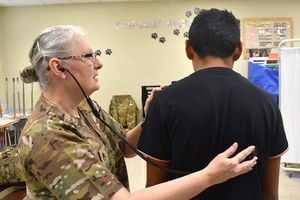Stuttgart Hauptbahnhof, the central hub for train services, was thrown Into chaos on the evening of February 4, 2025, as emergency medical personnel responded to a serious incident. The station was fully closed for about one hour, severely impacting commuters during peak rush hour.
The drama unfolded around 5:00 PM when alarm bells rang for emergency services following reports of an injured person. This prompted police and paramedics to rush to the scene. The Stuttgart Feuerwehr announced on the social media platform X at approximately 6:10 PM their operations had come to a conclusion.
Initially, to allow medical teams to work safely, the station was completely shut down, causing significant disruptions across the Bahnhof’s platforms. A spokesperson for the Bundespolizei indicated the closure applied to tracks 1 to 5 and 12 to 16, permitting trains to resume operations gradually after 6:10 PM. Most lines were operational again shortly before 7:00 PM.
Describing the situation, the primary response from the firefighters indicated this was classified as a “Personenunfall”—a person incident—though details on the individual involved remained sparse. The police confirmed the tragic news of the death of one male individual linked to the incident, but affirmed they could not yet comment on whether it was accidental or suicidal.
Through the ordeal, Deutsche Bahn issued communications explaining the full spectrum of service interruptions affecting train schedules, noting some services were completely canceled and others incurred delays. By 18:30, S-Bahn services were being restored alongside notifications about continued minor delays as the system recalibrated to its regular flow.
The Verkehrsverbund Stuttgart (VVS) also addressed commuter concerns on their website, warning of extended delays and partial service disruptions, especially along routes connected to Nordbahnhof where another medical emergency had been reported.
Such interruptions are not irregular for major German stations. A similar incident occurred recently at Tübingen Hauptbahnhof, where another individual lost their life due to train-related actions. This pattern remains concerning for officials, as public transport networks like Stuttgart Hauptbahnhof play pivotal roles for commuters and local economy.
Passenger reactions varied from frustration over the delays and lack of clarity during emergencies to expressions of concern for the injured individual not directly involved. Commuters found themselves scrambling to adapt schedules and make alternative travel arrangements amid the confusion at one of Germany's busiest railway hubs.
Coinciding with rush-hour chaos, reports of follow-up investigations by local law enforcement continued to emerge. Senior officers pledged comprehensive examinations of the circumstances surrounding the incident. Meanwhile, the Stuttgarter Feuerwehr strongly reminded the public of the necessity of keeping paths clear for emergency responses.
Reports highlighted the resilience and commitment of local authorities and emergency responders to maintaining safety protocols, even when faced with traumatic events. The effective management of such crises showcases the importance of decisive action and communication amid challenging scenarios.
A collective sigh of relief washed over the crowded platforms as train services resumed post-incident, albeit gradually. Passengers were left to ponder the fragility of life against the backdrop of daily commutes, seeking reassurance as they boarded the returning trains, reflective of the day’s harrowing events.



